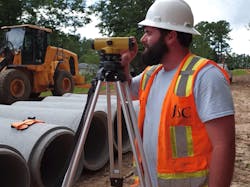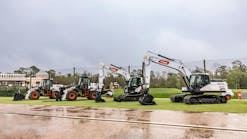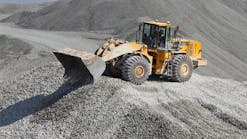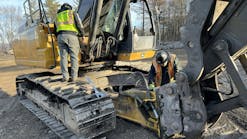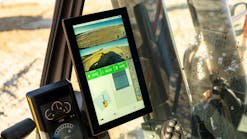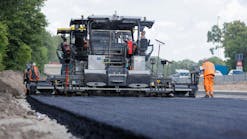He spent the next 12 years learning how to run a sitework business before going into business for himself five years ago. After sharing the company with a partner, Smith became the sole owner in 2020.
JSmith Civil started with commercial sitework and utilities first, and entered the heavy highway market two years ago.
Jeremy is a member of the Class of 2020 of the Under 40 in Construction Equipment.
“We’re diversified,” he says. “We’re in three distinct markets. So if one market gets tight, we can put more resources into another market. That really gives us an advantage over our competition.”
Jeremy Smith's path to owning his own company
In his 20s, Smith was succeeding in the landscaping business and decided to buy a small local sitework company in addition.
“I incorporated it into the landscaping company and was doing both at the same time,” he says.
It was an ambitious move, but Smith says that the ins and outs of running a sitework business were out of his wheelhouse.
“I didn’t know enough about sitework to be able to make it work,” he says. “I learned a lot of hard lessons. But I think the most important thing I learned early on was how to manage people. I made some mistakes...that helped me avoid that later.”
Smith sold the company and went to work for another local sitework company where he learned the business fundamentals he was lacking.
“After I had established myself at this sitework company, I wanted to start my own company again...with the correct fundamentals at that point,” Smith says. “Five years ago, I decided to start my own business with a partner in the general contracting business.”
After four years, Smith took ownership of the company and renamed it JSmith Civil in 2020. He has 140 employees and more than $100 million in revenue.
“Having a business partner to start with was great,” he says. “But even after she broke away, the business stood alone well. [Taking over] was definitely one of those milestone moments for me.”
Fleet management sustains growth
Smith’s fleet also includes “well over” 200 pieces of equipment including 34 excavators. When it comes to acquisition, he isn’t particular: Smith rents, leases, and buys as needed.
“We always aim to utilize and grow the equipment,” Smith says. “We also supplement our fleet by renting machines, but sometimes we’ll end up renting for over a year. In those cases, we’ll buy machines we’ve been renting long term. We try to keep our rentals in proportion with what we own.”
The company tends to lease larger excavators, usually over 65,000 pounds, and buy smaller excavators.
How JSmith Civil partners with its dealers.
“We started leaning toward leasing larger equipment because of the resale value,” he says. “It’s harder to get rid of a larger piece of equipment than a smaller piece of equipment.”
Similarly, Smith doesn’t gravitate toward any particular equipment brand. He finds it more viable to utilize different brands and equipment factors based on company needs.
“Some manufacturers might make a better excavator, while others will make a better dozer,” he says. “Technology also plays a big role in what company we go with. We’re really involved with GPS, equipment utilization, and equipment costs through telematics. If a machine or manufacturer doesn’t provide us with the technology or data we need, we’ll gravitate away from that company.”
Keeping tabs on machine data is a vital part of how Smith runs his business. The company uses onboard telematics and diagnostics to report any issues or faults on the equipment in-house.
In the five years since its inception, he’s hired a full fleet management division—including a logistics coordinator, equipment manager, shop foreman, and four full-time mechanics.
“They’re always tracking our equipment utilization and run time through HCSS [software],” he says. “We also install Topcon and NavMan GPS systems on the majority of equipment we get. Our GPS talks to our accounting software, so we get real-time equipment costs that we can use and manage with.”
Learn more about how JSmith Civil uses its job tracking software
Smith says GPS technology also helps with project efficiency and allows his team to better estimate equipment utilization.
“Our equipment is charged to the job based on the hours,” he says. “Even if you rent or lease a piece of equipment, you lease it by the hour. So if this equipment is idling for three or four hours a day and you cut that back to a half hour a day, you just saved yourself a lot of money on that lease.”
The company is also in the early stages of implementing HCSS job tracking software. The most recent piece of this software to be fully implemented is Heavy Job (newly named HCSS Field), allowing field crews to report their work time, equipment usage, safety reporting, daily reports, production, etc. They plan on implementing Dispatcher for tracking, scheduling, and dispatching company resources in the future.
“Technology is a part of every project at this point,” Smith says. “If you’re not using technology, you’re falling behind. You can’t manage what you don’t know, but [if you can provide] valuable data for yourself and your employees, you’re going to be better at what you do.”
Although Smith’s dealers only service a few of his machines, it may become a greater necessity for JSmith Civil in the future.
“We’re a fast-growing company, so we’re still figuring a lot out,” Smith says. “Right now almost everything we do is in-house. But as we grow, the geographic area we cover is getting bigger.
“If we’re working in a city that’s three or four hours away, it makes more sense for a dealer to go out and service a piece of equipment than it is to send one of our mechanics four hours down the road.”
In October, JSmith Civil began its largest project to date, working on the NCDOT C204131 urban widening project. With a contract value of $15,346,705, the project includes relocating approximately 10,000 feet of underground utilities, widening the roadway, 60,000 tons of asphalt paving, 12,000 feet of new storm drainage, and more.
“We’re doing all the underground work as well, like storm drainage improvements,” says JP Utz, project manager. “The utility relocation package is also in our scope, so we’re installing around 8,000 feet of new water lines for the city.”
Utz says the project is currently two months ahead of schedule.
“It’s an interesting job, you never know if you’re going to find something like this,” he says. “It’s our biggest in both scope and dollar value. It’s a big undertaking, especially for a company that’s five years old. Bidding something this big is pretty substantial.”
After five years, Smith says the business’ consistent growth is owed to the employees he hires.
“We have a lot of good people,” he says. “If you’re going to build a business, you’ve got to build the people. The people are the business, so that’s one of the main reasons we’ve been successful. Investing in equipment is important, but if you don’t have anybody to manage it, or run it, it’s not going to do you any good.
“I believe what we have done in the last five years is just the beginning,” he says. “Our company has built a strong foundation for future growth. We are confident that we can not only meet our goals for today, but are positioned for long-term success going forward. I’m really excited about the next five.”
